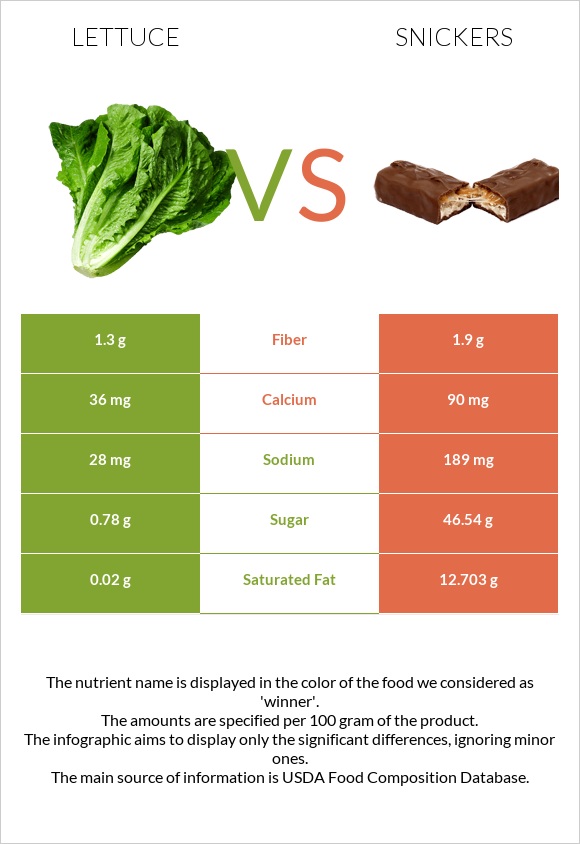Lettuce vs. Snickers — In-Depth Nutrition Comparison
Compare
Important differences between lettuce and snickers
- Lettuce has more vitamin A and vitamin C; however, snickers has more calcium.
- Lettuce's daily need coverage for vitamin A is 146% more.
- Lettuce has 18 times more vitamin C than snickers. Lettuce has 9.2mg of vitamin C, while snickers has 0.5mg.
- Lettuce is lower in sodium.
- Snickers has a higher glycemic index than lettuce.
The food varieties used in the comparison are Lettuce, green leaf, raw and Candies, MARS SNACKFOOD US, SNICKERS CRUNCHER.
Infographic

Infographic link
Mineral Comparison
Mineral comparison score is based on the number of minerals by which one or the other food is richer. The "coverage" charts below show how much of the daily needs can be covered by 300 grams of the food.
| Contains more MagnesiumMagnesium | +∞% |
| Contains more PotassiumPotassium | +∞% |
| Contains more IronIron | +26.5% |
| Contains more CopperCopper | +∞% |
| Contains more ZincZinc | +∞% |
| Contains more PhosphorusPhosphorus | +∞% |
| Contains less SodiumSodium | -85.2% |
| Contains more ManganeseManganese | +∞% |
| Contains more SeleniumSelenium | +∞% |
| Contains more CalciumCalcium | +150% |
Vitamin Comparison
Vitamin comparison score is based on the number of vitamins by which one or the other food is richer. The "coverage" charts below show how much of the daily needs can be covered by 300 grams of the food.
| Contains more Vitamin CVitamin C | +1740% |
| Contains more Vitamin AVitamin A | +∞% |
| Contains more Vitamin EVitamin E | +∞% |
| Contains more Vitamin B1Vitamin B1 | +∞% |
| Contains more Vitamin B2Vitamin B2 | +∞% |
| Contains more Vitamin B3Vitamin B3 | +∞% |
| Contains more Vitamin B5Vitamin B5 | +∞% |
| Contains more Vitamin B6Vitamin B6 | +∞% |
| Contains more Vitamin KVitamin K | +∞% |
| Contains more FolateFolate | +∞% |
All nutrients comparison - raw data values
| Nutrient |  |
 |
DV% diff. |
| Vitamin K | 126.3µg | 105% | |
| Saturated fat | 0.02g | 12.703g | 58% |
| Vitamin A | 370µg | 41% | |
| Fats | 0.15g | 24.38g | 37% |
| Calories | 15kcal | 488kcal | 24% |
| Carbs | 2.87g | 62.85g | 20% |
| Protein | 1.36g | 6.86g | 11% |
| Manganese | 0.25mg | 11% | |
| Vitamin C | 9.2mg | 0.5mg | 10% |
| Folate | 38µg | 10% | |
| Sodium | 28mg | 189mg | 7% |
| Vitamin B6 | 0.09mg | 7% | |
| Potassium | 194mg | 6% | |
| Vitamin B1 | 0.07mg | 6% | |
| Vitamin B2 | 0.08mg | 6% | |
| Calcium | 36mg | 90mg | 5% |
| Phosphorus | 29mg | 4% | |
| Cholesterol | 0mg | 9mg | 3% |
| Magnesium | 13mg | 3% | |
| Copper | 0.029mg | 3% | |
| Vitamin B5 | 0.134mg | 3% | |
| Iron | 0.86mg | 0.68mg | 2% |
| Fiber | 1.3g | 1.9g | 2% |
| Zinc | 0.18mg | 2% | |
| Vitamin B3 | 0.375mg | 2% | |
| Choline | 13.6mg | 2% | |
| Vitamin E | 0.22mg | 1% | |
| Selenium | 0.6µg | 1% | |
| Polyunsaturated fat | 0.082g | 1% | |
| Fructose | 0.43g | 1% | |
| Net carbs | 1.57g | 60.95g | N/A |
| Sugar | 0.78g | 46.54g | N/A |
| Trans fat | 0g | 0.394g | N/A |
| Monounsaturated fat | 0.006g | 0% | |
| Tryptophan | 0.009mg | 0% | |
| Threonine | 0.059mg | 0% | |
| Isoleucine | 0.084mg | 0% | |
| Leucine | 0.079mg | 0% | |
| Lysine | 0.084mg | 0% | |
| Methionine | 0.016mg | 0% | |
| Phenylalanine | 0.055mg | 0% | |
| Valine | 0.07mg | 0% | |
| Histidine | 0.022mg | 0% |
Macronutrient Comparison
Macronutrient breakdown side-by-side comparison
| Contains more WaterWater | +2024.8% |
| Contains more ProteinProtein | +404.4% |
| Contains more FatsFats | +16153.3% |
| Contains more CarbsCarbs | +2089.9% |
| Contains more OtherOther | +125% |
Fat Type Comparison
Fat type breakdown side-by-side comparison
| Contains less Sat. FatSaturated fat | -99.8% |
| Contains more Mono. FatMonounsaturated fat | +∞% |
| Contains more Poly. FatPolyunsaturated fat | +∞% |





